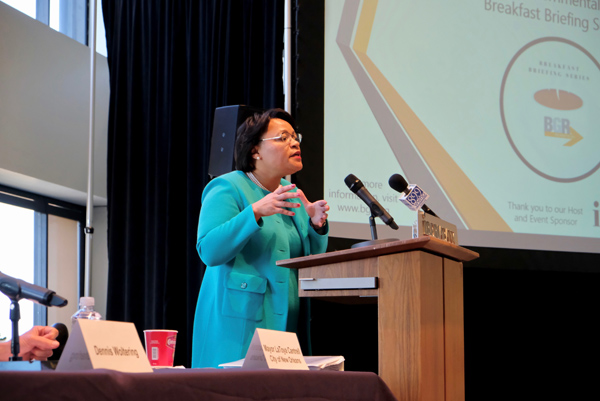
A phone call with S&WB shouldn’t replace a public meeting
By The Times-Picayune Editorial Board
Source: NOLA.com | The Times-Picayune
September 21, 2018
Mayor LaToya Cantrell says she held private conversations with Sewerage & Water Board members just to keep them informed after controversial pay raises for top officials became public.
The conversations were “independent calls” that were “very intentional only to inform, but nothing was voted on, no action was taken,” she said Tuesday at a Bureau of Governmental Affairs event. “So, it was not a meeting … It was information that was shared,” she said.
That doesn’t add up. NOLA.com | The Times-Picayune reported on the pay raises Aug. 16. On Aug. 20, the mayor announced the resignations of the interim S&WB executive director and three deputy directors who got the raises.
There was no meeting of the Sewerage & Water Board between those dates. So how did the employees come to resign?
Jade Brown-Russell, the interim executive director, described a discussion on a “conference call” with “several board members” about why she had authorized the pay raises, according to a copy of an Aug. 20 internal memo obtained by NOLA.com | The Times-Picayune. The memo doesn’t say who or how many board members were on the call.
The Lens reported last week that emails indicated at least eight board members had been expected to participate in the call. A second phone call was scheduled that five board members signed on to join, the emails obtained by the Lens showed.
Scott Sternberg, a New Orleans-based attorney who serves as general counsel for the Louisiana Press Association, said Tuesday that “there’s no question” the phone conversations conflict with the state’s open meetings law.
“The law is very clear that when a quorum of a public body gathers together to deliberate or discuss or receive information about something they have jurisdiction or control over, that’s a meeting,” Mr. Sternberg said in a phone call Tuesday. “It seems pretty clear to me that this was something that should have been properly noticed, and then there are plenty of procedures by which they can go into executive session and discuss things.”
The Sewerage & Water Board has a total of 10 members, including the mayor. Six or more members on a phone call would violate the open meetings law.
Sharonda Williams, an attorney representing the three deputy directors who were forced out, said in an Aug. 27 letter to S&WB leadership that the board “failed to comply with the requirements of the Louisiana Open Meetings Law.” The mayor would not have authority to ask for the deputy directors’ resignations “unless she was speaking on behalf of the entire Board based upon an action properly considered in an open meeting,” her letter said.
That makes sense.
Why wouldn’t Mayor Cantrell have simply called a public meeting to make sure the law was followed? As Mr. Sternberg said, the law provides for the board to hold a meeting but go into executive session to discuss personnel issues in private.
If that had happened, the mayor wouldn’t have to be answering questions about how she handled private conversations.
This isn’t the first time the administration opted for secrecy. Mayor Cantrell required members of her transition team to sign non-disclosure agreements. That sent the message that she didn’t want the public to know what transition committees were told or what they thought about the condition of the city.
A spokeswoman for the Cantrell campaign said at the time that the non-disclosure agreements were to encourage people to talk freely. That argument didn’t hold up. Other mayors and the governor didn’t require transition committees to work under non-disclosure agreements. And they were all able to get an honest assessment of the government.
Many New Orleanians disliked the fact that S&WB top execs got pay raises while customers were being overcharged and unfairly threatened with loss of water service.
But the decision on those S&WB staffers still should have been made in public and should have followed the law.
Fair Use Notice
This site occasionally reprints copyrighted material, the use of which has not always been specifically authorized by the copyright owner. We make such material available in our efforts to advance understanding of issues and to highlight the accomplishments of our affiliates. We believe this constitutes a “fair use” of any such copyrighted material as provided for in section 107 of the US Copyright Law. In accordance with Title 17 U.S.C. Section 107, the material on this site is available without profit. For more information go to: US CODE: Title 17,107. Limitations on exclusive rights: Fair use. If you wish to use copyrighted material from this site for purposes of your own that go beyond “fair use,” you must obtain permission from the copyright owner.
